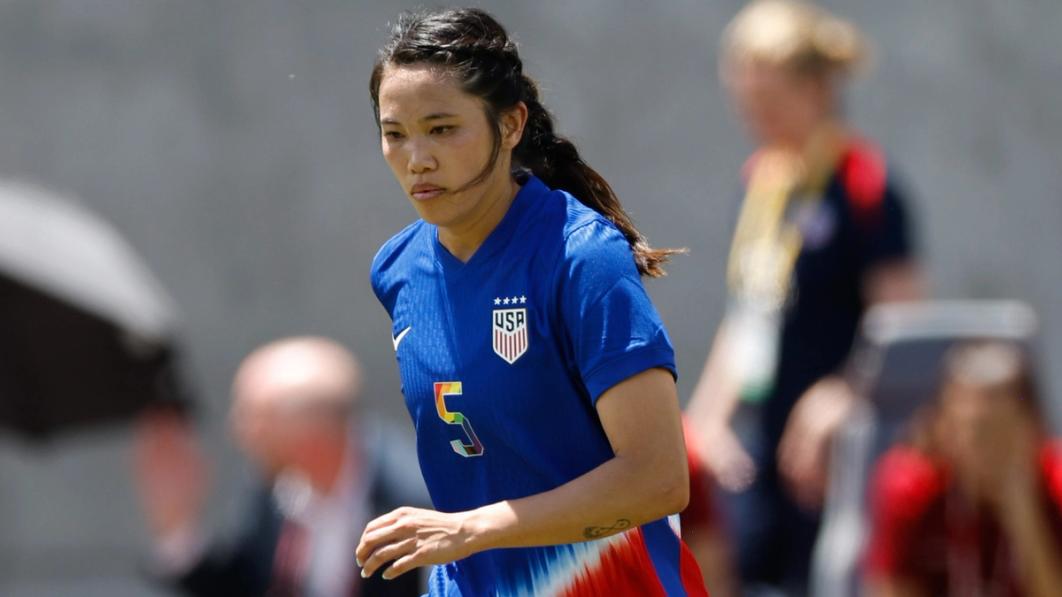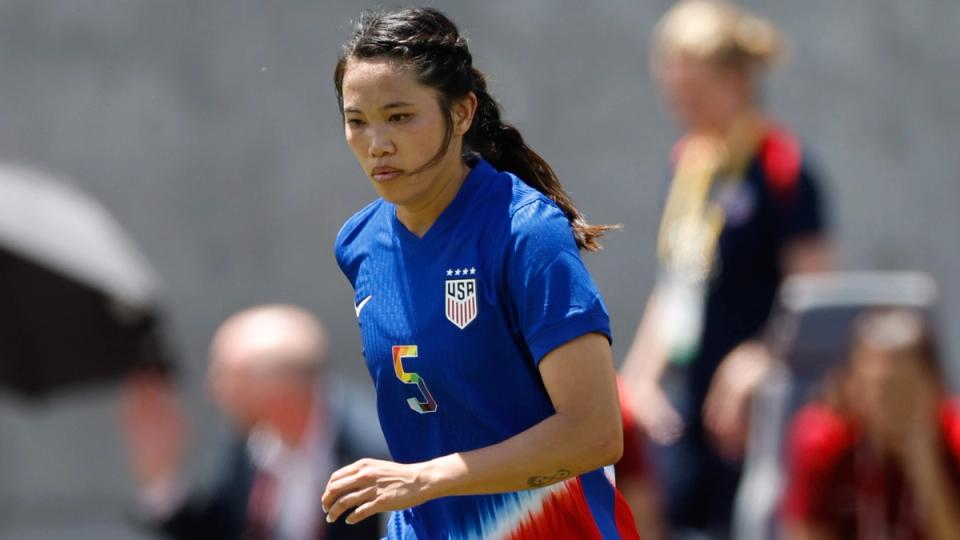Amy Griffin Names 21-Player U.S. Women’s Deaf National Team Training Camp Roster for Sept. 24-30 in Cary, North Carolina
Camp Serves as Final Gathering Before Deaf WNT Heads to Tokyo in Search of Record Fifth Deaflympics Gold Medal



ATLANTA (Sept. 17, 2025) – U.S. Women’s Deaf National Team head coach Amy Griffin has selected 21 players for the team’s upcoming domestic training camp to be held from Sept. 24-30 at WakeMed Soccer Park in Cary, North Carolina.
This camp reflects the Federation’s commitment to the U.S. Way, by investing in resources, infrastructure, and comprehensive support for the Extended National Teams, including the Deaf National Teams, to ensure they are fully prepared to compete and succeed on the world stage.
The gathering in Cary serves as the Deaf WNT’s last camp before heading to Tokyo, Japan this November in search of a record fifth Deaflympics gold medal. Along with winning three DIFA World Deaf Football Championships, the Deaf WNT has claimed gold at each of the previous Deaflympics where women’s football was included in 2005, 2009, 2013 and 2022.
“We’re excited to build on the momentum from our last camp and continue refining what already makes this team so strong,” Griffin said. “This camp allows us to narrow our focus and sharpen the small details that elevate performance, while also deepening the bonds that define who we are. We’re not starting from scratch — we’re adding to a foundation of unity and purpose, with an eye toward strengthening areas where growth is needed, while remaining committed to honoring the legacy of those who came before us and inspiring those who will follow. Training, playing matches and engaging with the community at these camps is heaven on earth with this group and we aim to maximize every second.”
The roster is led by captain Kate Ward (Atlanta, Ga.), all-time leading scorer Emily Spreeman (Fountain Valley, Calif.), 2024 U.S. Soccer Deaf Female Player of the Year Sydney Andrews (Wichita, Kan.) as well as veteran midfielder Gracie Fitzgerald (Georgetown, Ind.).
The Deaf WNT’s time in Cary will serve as the team’s “send-off” for the Deaflympics, with a number of different events planned for the weekend. Ahead of North Carolina FC’s USL Championship match against Miami FC on Friday, Sept. 26, the Deaf WNT will take part in a Meet and Greet at the Pre-Game HQ at 6 p.m. and the team will be honored on-field at halftime of the match at First Horizon Stadium at WakeMed Park.
The following day, the Deaf WNT will play a friendly against North Carolina FC Youth at 10 a.m. ET, and admission for the friendly match is FREE. Afterwards, Deaf WNT players will take part in a youth clinic hosted by USA Deaf Soccer at 1 p.m. ET. Players interested in the clinic can find more information here.
GOALKEEPERS (4): Payton Degraw^ (Salt Lake City, Utah; 5/0), Taegan Ferrin^ (Centerville, Utah; 9/0), Sierra Kaspar* (Fort Worth, Texas; 0/0), Meghan Maiwald (Gilroy, Calif.; 14/0)
DEFENDERS (7): Sydney Andrews^ (Wichita, Kan.; 30/1), Paige Beaudry^ (Riverview, Mich.; 12/1), Josephine Blazic (East Tawas, Mich.; 1/1), Erin Cembrale^ (Oyster Bay, N.Y.; 13/5), Melia Lenert (Long Beach, Calif.; 2/0), Chelsey Tumey (Peoria, Ariz.; 2/0), Faith Wylie^ (Decatur, Texas; 13/6)
MIDFIELDERS (8): Gracie Fitzgerald^ (Georgetown, Ind.; 20/4), Holly Hunter^ (Temecula, Calif.; 6/7), Tia LaBrecque (Raynham, Mass.; 2/1), Emma Neff (Oakwood, Ohio; 6/1), Paris Price^ (Fall City, Wash.; 14/2), Sabina Shysh^ (Tuscon, Ariz.; 4/1), Kate Ward^ (Atlanta, Ga.; 31/8), Mia White^ (Littleton, Colo.; 14/1)
FORWARDS (2): Emily Spreeman^ (Fountain Valley, Calif.; 26/38), Sophie Post^ (Murray, Utah; 14/9)
^Part of squad at 2023 World Deaf Football Championships
The Deaf WNT took its initial steps in 1999, when the first U.S. side won the St. John’s Tournament, a small-sided competition played in London, England. Two years later, the team was again victorious at 2001 De Hearne Kortrijk Indoor Tournament in Belgium. Those two competitions laid the groundwork for the modern U.S. Women’s Deaf National Team which began competing in 11-a-side competition at the 2005 Deaflympics in Melbourne, Australia.
Since that time, the Deaf WNT has gone a remarkable 40W-0L-1D in 41 all-time international matches, outscoring its opponents 201-16 en route to winning four Deaflympics (2005, 2009, 2013 and 2022) and three World Deaf Football Championships (2012, 2016 and 2023). And what about that one draw in their record? That came in the 2022 Deaflympics Final, when the USA tied Poland 2-2, claiming its fourth gold medal by winning 4-2 on penalty kicks.
The team is led by two world champions in head coach Amy Griffin and assistant coach Joy Fawcett. The pair helped the U.S. Women’s National Team take home the first FIFA Women’s World Cup in 1991, while Fawcett also represented the U.S. at the 1995, 1999 and 2003 tournaments, winning another World Cup in 1999. Fawcett also won gold medals with the USWNT at the 1996 and 2004 Summer Olympics.
Out of the five disciplines that make up U.S. Soccer’s ENT programming, Deaf Soccer holds the closest resemblance to the standard game, with only two main rules that differentiate it. First, the sport is contested by Deaf and hard-of-hearing athletes, with qualifying players needing to have a hearing loss of at least 55 decibels in their “better ear”. All players competing in Deaf matches must remove all hearing aids before playing.
Secondly, referees have a flag which they raise along with blowing their whistle to provide a visual cue for players to know when play has stopped. Aside from those two adaptations, Deaf Soccer follows the standard 11-a-side Laws of the Game governed by the International Football Association Board.
The U.S. Way is a shared philosophy, a strategy and a practical toolkit to enable excellence at every level of the game and for us to win. The U.S. Way is intended to work in partnership between the club and National Team environment to cultivate the next generation of talent with three areas of focus: World Class Development Pathways and Environments, including scaled Talent Identification, expanded Youth National Team programming and accelerated development and foundation building across the Extended National Teams; Shared and Scaled Infrastructure, highlighted by the Arthur M. Blank U.S. Soccer National Training Center, U.S. Way digital platform and unified youth calendar; and Professional Development for the Entire Ecosystem, featuring formal courses, technical and administrative staff community building, leadership development, and best practice resource sharing. For more information, visit ussoccer.com/ourvision/us-way.